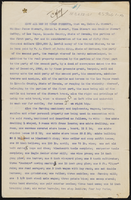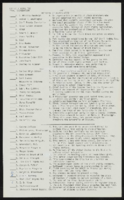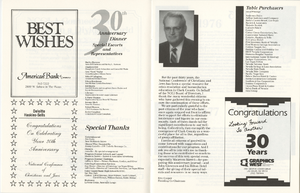Search the Special Collections and Archives Portal
Search Results

Alpha Kappa Alpha Sorority, Theta Theta Omega Chapter Health committee reports and National Black Leadership Initiative on Cancer, Las Vegas coalition (NBLIC) fliers
Date
Archival Collection
Description
From the Alpha Kappa Alpha Sorority, Incorporated, Theta Theta Omega Chapter Records (MS-01014) -- Chapter records file.
Text

Transcript of interview with Michael S. Mack by Barbara Tabach, May 20, 2015
Date
Archival Collection
Description
In this oral history Michael Mack discusses his early memories of Las Vegas such as attending the Fifth Street School and activities him and his friends participated in. The interview also includes his memories of different members of the Mack family and their activities. He reminisces about his many visits to the Flamingo Hotel as well as being taken by his parent to floor shows. He also discusses what it was like to grow up Jewish in Las Vegas and the way Jews helped build the community.
Text

Stewart family real estate documents
Date
Archival Collection
Description
Stewart family real estate documents
Text

Transcript of interview with Maxwell Kent "Tim" Hafen by Stefani Evans and Claytee White, September 14, 2016
Date
Archival Collection
Description
With so much emphasis put on the growth of Las Vegas and Henderson over the past thirty years, we often forget about the development of the others cities in the Valley. Expansive growth in Southern Nevada in the mid-twentieth century shows the region being one of the last bastions of agricultural existence, and Tim Hafen has been a major player in the development of the city of Pahrump. Born in St. George, Utah, and raised in Mesquite, Nevada, he graduated from Virgin Valley High School and attended Dixie College. Before the Bureau of Land Management (BLM) was called as such, his father introduced him to the working of the land through dairy and hay farming, where a young Tim decided he would never milk a cow again. His rejection of cow milking didn’t deter him from following the influence of his father after he married his wife, Eleanor, in 1951 and moved to Pahrump to become a cotton farmer. At that time, there were only 150 people in the area with a third of the population being from the Paiute tribe. Once the city was incorporated in 1964, he founded the Pahrump Valley Utility Company to get electricity to the area along with Amargosa Valley. Top crops at the time included cotton, alfalfa as well as wheat that were picked by Mexican farm laborers used under a yearlong contract with the Bracero program. vi In this interview, Hafen shares how he began his career in politics from getting called for grand jury in 1963. From 1966–1974, he was a member of the legislature, where he served two terms in the Old Capital building and held various positions such as Chairman of the State Board of Agriculture for twelve years and President of the Nevada Farm Bureau. He was speaker pro tem and Chairman of the taxation committee and decided to call it quits because of the Nixon scandal. Between 1974 and 1975 Hafen ended his political career, which he did before brothels began to come to the area later in the decade. In 1982, in the wake of the gasoline crisis, Hafen, like other Pahrump cotton farmers, could not afford to continue farming; he decided to shift from farming to development. His first development done was Cottonwoods at Hafen Ranch, which was on 160 acres of alluvial fan, non-farmable land; in 2000 he opened his second subdivision, Artesia at Hafen Ranch.
Text

Interview with Sandie A. Medina, January 25, 2004
Date
Archival Collection
Description
Text

Interview with Norma Cox, June 8, 2004
Date
Archival Collection
Description
Text

UNLV Ethnic Studies 102 final exam (blank) and Ethnic Studies (ETS 480X) "Seminar in Race Awareness: Minority Groups and Media" assigned readings
Date
Archival Collection
Description
From the Roosevelt Fitzgerald Professional Papers (MS-01082) -- Personal and professional papers file.
Text

Lawrence Chiu Hill oral history interview: transcript
Date
Archival Collection
Description
Oral history interview with Lawrence Chiu Hill oral history interview conducted by Cecilia Winchell, Nessa Concepcion, and Stefani Evans on November 8, 2021 for Reflections: The Las Vegas Asian American and Pacific Islander Oral History Project. Lawrence "Larry" Chiu Hill shares his experiences growing up in Taiwan and immigrating with his family to South America, then moving to Corpus Christi, Texas, and finally Las Vegas, Nevada. He discusses his education at University of Nevada, Las Vegas as a Political Science graduate and his career path moving from casino gaming into the practice of law. Lawrence manages his own firm, Lawrence C. Hill and Associates, and talks about his work, his family, and the community he has created in over two decades of living in Las Vegas.
Text

Tanya Olson oral history interview: transcript
Date
Archival Collection
Description
Oral history interview with Tanya Olson conducted by Claytee D. White on July 6, 2018 for the Remembering 1 October Oral History Project. In this interview, Olson recalls beginning October 2, 2017 to photograph scenes surrounding the aftermath of the shooting at the Route 91 Country Music Festival. Her efforts culminated in a film that highlights the Healing Garden, a memorial established after the shooting. It was dedicated on the first Friday of October 2017. Her 6-minute film, Forever In Our Hearts, is described as "Citizens unite to provide kindness and salve the wounds caused by the October 1, 2017 massacre during a Las Vegas country concert." The film was shown at the Nevada Women's Film Festival in 2018. Olson discusses beginning her latest endeavor, matriculating at the American Film Institute, a lifelong dream that she is pursuing after 23 years in the military, a film degree from University of Nevada, Las Vegas (UNLV), and completing her film project on one of the worst massacres in American history.
Text

Program for 30th Anniversary Dinner event for the Southern Nevada Chapter of the National Conference of Christians and Jews, 1988
Date
Archival Collection
Description
The program for the 30th anniversary dinner for NCCJ includes dedications and highlights of the Southern Nevada Chapter.
Text
